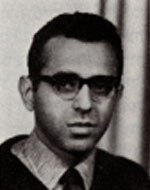Arieh, son of Grace and Yitzhak-Haim, was born on January 7, 1938 in Shanghai, China, and immigrated to Israel with his family in 1951. He attended an English primary school in Shanghai and an elementary school in the United States, He continued his studies at the Schloe High School in Tel Aviv and at the B-2 Municipal High School in Tel Aviv in a humane direction, thanks to the Jewish education he received from teachers and rabbis in his parents’ home, Aryeh began reading Hebrew when he was three, He immigrated to the Torah as a “Baptist.” His parents came to Shanghai from Baghdad, through India at the turn of the century, and their home was a meeting place for sages and open to all needy. When he was nine years old, his family spent a year in the United States, and after the Communists came to power in China, the family was forced to move to Hong Kong, where she immigrated to Israel and settled in Tel Aviv. He was a very modest and humble man, he kept the commandments of Judaism meticulously, studied and expanded his knowledge, many friends he had, and the connections he had made throughout his life, and was drafted into the IDF in mid-December 1955, Of the religious “Scouts”, was posted to the Nahal Brigade. After basic training and after completing Shalat in the Kerem Shalom outpost, which was one of its precursors, and at Kibbutz Sa’ad and Lavi, Aryeh took part in an 81mm mortar and platoon training course and was assigned to a paratroopers’ battalion. In the course of his service, Lechem arranged for the Sinai Campaign and even established with his friends the settlement in the Rafah area. After completing his regular service, he was assigned to reserve duty as a medium-sized mortar in a paratroopers battalion. As a reservist, he participated in the Six-Day War. In 1959 Aryeh began studying Jewish studies in general, and Bible in particular, at the Hebrew University of Jerusalem and at the same time worked in various works. He worked on his studies until late at night and early in the morning to distribute newspapers. He was also a proofreader and later taught in high school. After completing his bachelor’s degree, he continued to study for a master’s degree and was appointed as an assistant in the Department of Bible at the Hebrew University. After receiving his master’s degree, he began teaching in the Department of Bible at Bar-Ilan University and wrote a doctoral dissertation on the subject of “Matan Torah in the Sinai.” Aryeh excelled in his scientific meticulousness and demanded much from himself and his students. He taught them with enthusiasm and was particularly diligent in developing their own ability to think, and indeed all his students respected him and loved him. At the same time, his tendency to engage in research increased, and he succeeded in combining a critical examination of the Bible with his religious worldview. Arieh became very interested in prayer forms and customs, focusing especially on the tradition of his father’s home. From 1969 to 1970 he did a training course in Switzerland. In 1971 he married his girlfriend Ruth. He completed his doctoral dissertation two weeks before the Yom Kippur War broke out and was approved after his death. This study was recently published as a book entitled “Matan Torah in Sinai”, published by Magnes Press, Jerusalem. When the Yom Kippur War broke out, Aryeh did reserve duty at the Milgo stronghold on the Suez Canal. On October 8, 1973, during the withdrawal of the fighters from the stronghold to Qantara, Aryeh was hit and killed in one of the city’s extremist houses. His body was returned from the territory held by the Egyptians only four months later, and he was brought to rest in the Mount of Olives cemetery. He left behind a wife and two daughters. Parents, two sisters and a brother. After his fall, he was promoted to corporal. In a letter of condolence to the bereaved family, the commander of his regiment wrote: “Aryeh fought with great courage, showed great devotion to his comrades, courage and resourcefulness in the battle and acted with great trepidation and great self-risk until his downfall.”And his family set up a fund in his name to encourage Torah education among young people, mainly from the Eastern communities, and wrote a Torah scroll in his memory. The Hebrew University of Jerusalem published a book called Nizkor in memory of its students, Ovadia and Moriah , Who fell in the Yom Kippur War, with remarks about Aryeh.
